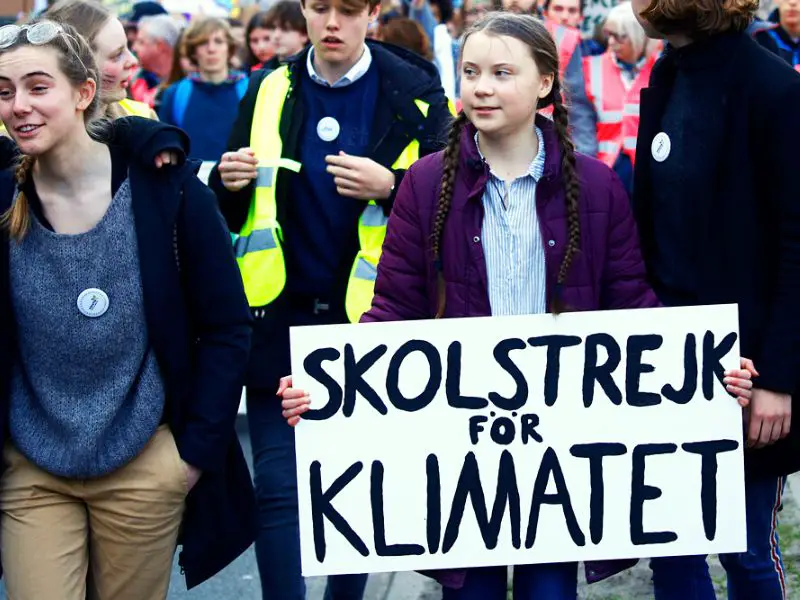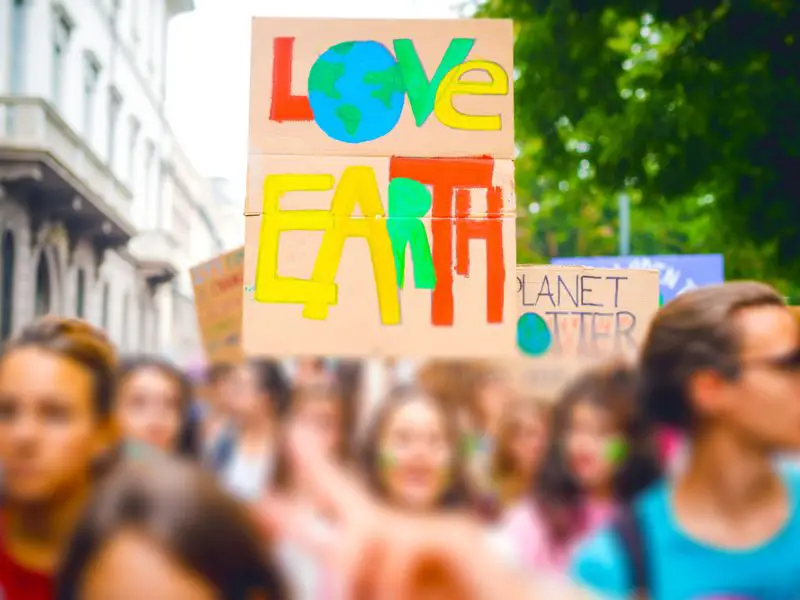Greta Thunberg is a Swedish climate activist who inspires people worldwide with her activism and speech against climate change. As a young teenager, she garnered international attention when she started to protest the Swedish government’s inaction on climate change. Since she started protesting, she has inspired many others to join her in her mission.
Greta Thunberg
Greta was born in Stockholm, Sweden in 2013. She began studying climate change when she was eight years old. The more she discovered, the more perplexed she grew about why so little was being done. When she was 11, Greta got so depressed about climate change that she momentarily stopped speaking.

“Greta Thunberg is proof that you’re never too young to make a difference.”
— Malala Yousafzai
Greta was diagnosed with Asperger syndrome, a disorder that interferes with social interactions. Greta, however, refers to her illness as a “superpower” and sees it as a benefit. She claims there are “no gray areas when it comes to climate change”.
Greta was diagnosed with Asperger syndrome, autism spectrum disease (ASD). It is distinguished by impairments in social interactions (as in traditional autism) but by normal cognitive and language development. People with Asperger syndrome tend to get obsessed with a single topic or subject, and Thunberg’s passion became climate change.
She initially became aware of the climate problem when she was about eight years old, and within a few years, she adjusted her lifestyle by being vegan and refraining from flying. (Aircraft and livestock release many of the gases that cause global warming.)
Greta’s Climate Activism
Schools Strike for Climate
Greta’s first act of activism was to protest outside the Swedish Parliament in 2015. She held a sign that said “Skolstrejk for klimaet,” which means “Schools strike for climate.”

“Greta Thunberg’s relentless determination reminds us that we must act with urgency to address the climate crisis.”
— Antonio Guterres, UN Secretary-General
Even though her campaign was small, it quickly got a lot of attention worldwide and inspired tens of thousands of young people to do something about climate change. By the end of 2018, Greta’s campaign had reached people worldwide, from Japan to the UK.
About 20,000 students quickly joined Greta in her school’s strikes to bring the ever-important threats of global warming and climate change to the eyes of government leaders. Greta’s perseverance and dedication earned her the Nobel Peace Prize nomination.
World Economic Forum Speech 2019
Greta attended the World Economic Forum 2019, where she made a speech in which she stated “our house is on fire.”
UN Climate Action Summit
Greta also attended the United Nations Climate Action Summit in 2019, where she joined other young activists in a news conference hosted by the United Nations Children’s Fund. She filed an official complaint against five countries for failing to reach carbon reduction objectives.
World Economic Forum 2020
Greta joined the World Economic Forum in 2020, just before the Covid-19 outbreak. Throughout her stay at the convention, she made a series of speeches and claimed that ‘our house is still on fire.’
European Parliament Environment Committee
In the year 2020, Greta was also present at a session of the Environment Committee of the European Parliament. There, she and the committee spoke about the European Climate Legislation, and they concluded that the latest proposal for a climate law was a capitulation.
Campaigns Throughout the Covid Pandemic
Greta was forced to take her activism virtual in March 2020, after the Covid-19 outbreak started, utilizing her social media profiles to continue spreading her climate action message.
In 2021, she joined hundreds of others in petitioning the UN to declare a Level 3 Global Climate Emergency. She also visited the COP26 summit, where she joined in demonstrations and termed COP26 ‘a disaster’ and condemned them of ‘greenwashing.’
Greta’s climate activism is seen in Ted talks, Time, and other global movements.
Greta Thunberg’s Take on How to Live Greener
1. Educate Yourself
“Educating yourself about the climate crisis is one of the most powerful things we can do,” – Greta
Educate yourself on the climate crisis and do what you can to reduce your carbon footprint: use public transport instead of your car; recycle; eat less meat; walk or cycle instead of using your vehicle; insulate your home; turn off lights; plant trees; take shorter showers; reuse things; and so on. Even small actions add up! And the more you learn about it, the more motivated you’ll be! Remember: every little bit helps.

“Greta Thunberg is a powerful reminder that we are the stewards of our planet’s future.”
— Ban Ki-moon, Former UN Secretary-General
2. Gather More Information
“The sustainability crisis is a crisis of information not getting through,” Greta.
So we have to be the ones to spread information. We can’t be passive and wait for politicians to act — we have to force them to work by demanding that they do. And one of the best ways to do that is by educating ourselves and sharing our knowledge with others. The more we know, the more powerful we can be. We need to speak up now: speak up to our friends, our families, our neighbors, and our politicians — we must demand change.
3. Travel With Greener Intentions
Adopt eco-friendly transportation, choose electric choices, and use public transportation, such as trains, trams, buses, and ferries. In Greta’s climate activism, she demands authorities provide free low-carbon logistics and subsidize trains instead of flights while we study solutions for carpooling and car sharing.
Greta also points out that the tourism industry is responsible for about 8% of total emissions and that the world’s wealthiest people are responsible for 50% of all aviation emissions.
Additionally, Greta draws attention to the fact that the tourist business is responsible for around eight percent of global emissions and that the wealthiest people in the world are responsible for fifty percent of the aviation sector’s emissions. That’s why it’s important to leave as much money as possible in the wallets of locals in underdeveloped countries while traveling there to show your support for their way of life and the economy.
4. Keep Away From Disposability
Our plastic addiction is killing us. Microplastics pollute every part of our ecosystem. Plus, plastics are manufactured from petrochemicals. In addition, the production of plastics requires the usage of petrochemicals; thus, we need to recycle as much plastic as possible. The aim is to move back toward items that have a longer lifespan and continue circulating. Help avoid the plundering of natural resources and energy required to make all those throwaway things, and continue prolonging the life of everything you use.
5. Support the Restoration of Forests
By participating in activities that are beneficial to nature, not only will you be assisting in the revitalization of degraded ecosystems such as forests, wetlands, savannahs, and reefs, but you will also be assisting in the regeneration of life on Earth, which will, in turn, support the reduction of a significant portion of the amount of carbon that we have added to the atmosphere.
6. Improve Biodiversity
Every ecosystem is interdependent, and every cog is needed to keep this machine known as planet Earth running. Let’s pay for trips and activities that raise money for wildlife conservation since many plant and animal species are in danger of extinction. Each species we lose brings us one step closer to destroying the web of life that keeps us alive.
Author’s Note
Apart from taking action for the planet, you can also participate in more campaigns like #FridaysForFuture, organized by the youth to support the #ClimateStrike. So make sure to spread awareness and educate others about the importance of preserving our planet and fighting climate change.
Related: Everyday Habits for a More Sustainable Lifestyle, Organizations Fighting Ocean Pollution, Live a Zero Waste Lifestyle,


3 thoughts on “The Greta Thunberg Story and How to Live a Greener Lifestyle”